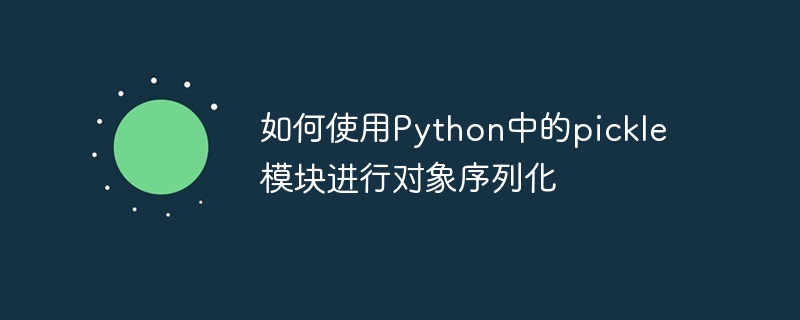

How to use the pickle module in Python for object serialization
Overview:
In Python programming, we often need to save data to a file or over the network transmission. Object serialization is a process of converting objects into a format that can be stored or transmitted, and the pickle module is a commonly used serialization module in Python. The pickle module can convert any Python object into a sequence of bytes so that the object can be reconstructed when needed. This article will introduce the use of pickle module in detail, including the serialization and deserialization process, and provide specific code examples.
import pickle
The object can then be serialized into a file using the pickle.dump() method.
# 创建一个对象
data = {'name': 'Alice', 'age': 24}
# 将对象序列化到文件 'data.pkl'
with open('data.pkl', 'wb') as file: # 注意需要以二进制模式写入文件
pickle.dump(data, file)In the above example, we created a dictionary object data and used the pickle.dump() method to serialize the object into a file named 'data.pkl'. It is important to note that the file needs to be opened in binary mode in order for the serialization operation to occur correctly.
# 从文件 'data.pkl' 中反序列化对象
with open('data.pkl', 'rb') as file: # 注意需要以二进制模式读取文件
data = pickle.load(file)
print(data)In the above example, we use the pickle.load() method to deserialize the object from the 'data.pkl' file and print the result. Likewise, the file needs to be read in binary mode.
To sum up, the pickle module is a commonly used object serialization module in Python. It conveniently serializes a Python object into a sequence of bytes and reconstructs the object when needed. When using pickle for object serialization and deserialization, you need to pay attention to the file reading and writing mode and the source credibility of the data.
Summary:
This article introduces how to use the pickle module in Python for object serialization. By calling the pickle.dump() method, we can serialize the object into the file; at the same time, by calling the pickle.load() method, we can deserialize the object from the file. However, you need to pay attention to some potential problems when using pickle, such as whether the class definition of the object is available, the source of the data is credible, etc. By flexibly using the pickle module, we can better handle the serialization needs of Python objects, thereby improving the flexibility and scalability of the program.
(Note: The above is a reference example, not the real code, please make appropriate adjustments according to the actual situation)
The above is the detailed content of How to use pickle module in Python for object serialization. For more information, please follow other related articles on the PHP Chinese website!




